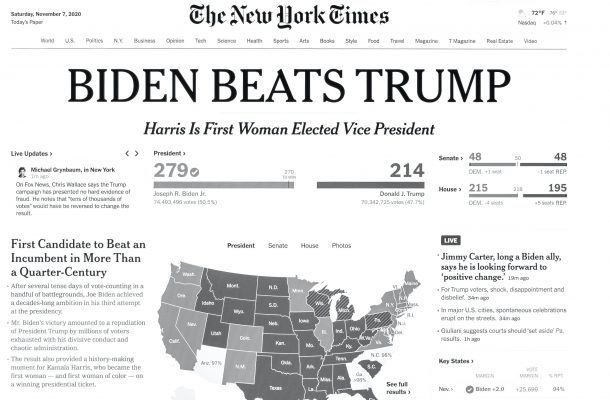Arvanitakis on American politics: Biden’s score card

It has been almost twelve months since the 2020 election with the mid-terms only a year away. Historically, the mid-terms see a swing away from the incumbent President’s party. This means that with the Democrats having a thin majority in both the House and the Senate, what happens over the next twelve months will lay the foundation for the 2024 presidential election.
Twelve months in, how can we assess the Biden Administration? Here are four areas worth reflecting on.
Adults in the room
Inevitably, Biden will draw comparisons to Trump. In. one area that Biden rates well in is the discipline of his team.
Within the first twelve months of the Trump Administration, infighting, leaks, and firings were the norm: from Sean Spicer and Jeff Sessions, to acting Attorney General Sally Yates (who was sacked for arguing the Muslim ban was unconstitutional), to the ten-day tenure of communications director Anthony Scaramucci (who can forget his graphic interview about his White House rivals), to the public firing of FBI Director James Comey.
There was a sense of chaos with dozens of key government posts remaining unfulfilled.
In contrast, there has been no such chaos in the Biden Administration. Biden portrayed himself as a steadying hand: someone who would restore the trust in government and create a sense of business as usual – and here he has been successful.
Foreign policy
Biden began with serious efforts to restore damaged relations with allies. This started well enough as Biden shored up allies to confront China and Russia, as well as rebuilding ties with Europe and NATO that Trump had damaged.
These early gains have, however, dramatically dissipated with the botched withdrawal of USA presence in Afghanistan.
Coming 20 years after the Twin Tower terrorist attacks, the chaotic withdrawal of the US and its allies was accompanied by horrific scenes at Kabul Airport. Biden claimed that he was seeing through a deal brokered by the Trump Administration. While this may have been the case, the poor execution of the withdrawal damaged America’s reputation and relations in the area and opened another door for Chinese influence.
Another poor showing was the handling of the new Australian, UK, US alliance (or AUKUS) which resulted in Australia cancelling its submarine contracts with the French. The impact here must be seen from two perspectives.
The first is that it further eroded the trust being rebuilt with a key European ally which was only just recovering from the Trump years. It also surprised key allies in the region who fear a new arms race.
Secondly, and as noted by Professor Jean-François Huchet from France’s Institut National des Langues et Civilisations Orientales in a soon to be released interview, France’s fury has less to do with the economic impacts than the need to realign its Pacific strategy.
As unlikely as it seems with all the Australian government’s muscle flexing about ‘increased capability’ of our submarine fleet, the possible withdrawal of a key partner from the region may well be another win for China.
Reversal of policies… not quite
Biden came in with a clear intent to reverse key Trump era policies. In the first month of his presidency, Biden issued more than three dozen executive orders and memorandums on a wide range of issues.
Most of these directly reversed a number of Trump initiatives including the US withdrawal from the World Health Organisation (WHO), the ban on transgender people serving in the military, agency changes meant to address systemic racism, the travel ban on people from several mostly Muslim countries, the Paris Agreements, and directed agencies to buy things made in America.
The president also signed a slew of orders directed at the COVID-19 pandemic, including a mask mandate in federal buildings and in certain public transportation.
One area that Biden promised to act on but now seems unlikely is the US position on the southern border. In fact, recent reports indicate that the Biden administration is preparing to revive several controversial Trump-era border policies including one that forces migrants to stay in Mexico until their US immigration court date.
The pandemic and the economy
In September 2020, as the first presidential debate between Biden and Trump took place with the focus on the US response to Covid. When asked to address Trump’s performance during the pandemic, Biden gave stark statistics, highlighting the approximate 200,000 US Covid deaths.
Today, the number of deaths sits at 720,000.
While Biden was praised for his initial progress towards Covid, the delta strain created new challenges. Though his supporters may argue that this was beyond Biden’s control, if he is taking credit for wins, he can hardly blame events beyond his control when the reverse happens.
So how do we assess the Biden Presidency? We have a mixed bag which is reflected in various opinion polls. While a decline of Biden’s popularity was always going to happen following the honeymoon period, the concern for Democrats is the fading approval amongst groups central to his base: most notably Black voters and women.
Biden is banking his presidency on the far-reaching spending bills spanning infrastructure, education, healthcare, climate change and more which would see federal spending at its highest sustained level since the World War II.
While initial progress was made in passing the $3.5 trillion bill, the divisions with the Democratic Party have derailed momentum.
This is a pity for Biden because his economic agenda remains popular and is necessary to revive a nation that has long ignored basic infrastructure.
Biden can reverse these negative trends if he can negotiate his way through Democratic division and see his bill passed – his ability to do so will ultimately define his presidency.
Professor James Arvanitakis is the Executive Director of the Australian American Fulbright Commission – one of the world’s most prestigious international education and cultural exchange programs.












